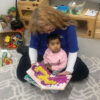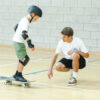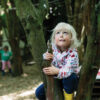
by Sian Eaton
Osteopath and Specialist Paediatric Osteopath
Cranial osteopaths treat children and babies, right? Wrong. Here’s how to tell who’s most suited to treat your little ones.
A cranial osteopath uses very gentle techniques to treat the body but may not have experience treating children. A paediatric osteopath treats babies and children and has completed further study to have a broader skill set to enable them to do this in whichever way is best suited to the individual.
A paediatric osteopath will have undertaken further extensive training and be able to assess and advise on general paediatric health and development. They may use cranial osteopathy techniques for part or all of the appointment and typically, a paediatric osteopath, will also give advice on feeding, sleeping and exercises to do at home. They will also be equipped to refer to other healthcare practitioners if needed.
Confused? Don’t be…
What can a paediatric osteopath help with?
Paediatric osteopaths treat a wide variety of patients from newborns to teenagers.
Newborns can struggle with the effects of birth – even the most medically straightforward birth can leave the baby a little uncomfortable, typically around the head, neck and shoulders. The most common issues are a slightly altered head shape or a struggle to latch on or
find a comfortable position when they are feeding.
Babies can often suffer with digestive issues such as reflux and colic. Their digestive system isn’t fully developed at birth and they can suffer with pain and vomiting.
As they get older and start to move around, parents might notice uneven movement or any developmental issues might become more apparent.
Toddlers: Once little ones get on their feet, issues with limbs might become noticeable such as pain or discomfort in their feet, knees or hips.
Preschoolers: This is the age when speech and language really develops and issues can be detected, often due to glue ear and adenoid problems.
School children: Will often come in with an injury from the playground or their parent/carer may have noticed a change in their movement.
Teenagers: Can suffer with similar issues with their bodies as adults, sore necks after too much school work or an injury from sport. Their musculoskeletal systems haven’t finished growing yet so the way they are treated is important and there are certain conditions that effect them that wouldn’t occur in an adult.
What would an initial appointment involve?
The initial appointment is focused on getting to know the child and giving them a full assessment. This will vary depending on the child’s age.
For the newborns and babies a lot of the discussion will be based around birth and pregnancy and then a thorough examination is performed to check everything from head to toe, paying particular attention to the issue they are coming in with.
For instance with a breastfeeding issue they would be assessed for their latch and possible tongue tie issues, along with their head and neck movement. Or for the reflux/colicky baby, paying specific attention to rule out Cows Milk Protein Allergies or more structural issues such as pyloric stenosis (a narrowing of the opening from the stomach to the first part of the small intestine).
For an older child, time will be spent talking to the child and parent/carer to get to know them, their home life and their childcare or learning environment. The examination is then usually a much more active process that can involve playing with toys or equipment. Once the child has been assessed, there would be a discussion about if treatment is needed and what would then be involved.
Is it safe?
Yes. A paediatric osteopath will take care with your child and the techniques used will be very gentle and subtle. Parents often comment that their child will be more settled and often tired and sleep for longer periods after a treatment.
All osteopaths are registered with The General Osteopathic Council and are fully insured.
Osteopathy is considered an essential service and osteopaths are allowed to continue to work through national lockdowns and through all tiers of local restrictions. We have high levels of cleanliness and PPE use.
Sian Eaton is a Specialist Paediatric Osteopath and qualified in 2004 from the British School of Osteopathy. Sian lives in Sussex and has two small children of her own. Her clinic is in Hove (www.thespacehove.co.uk) for further information and booking or please contact Sian directly on 07788 554409.
www.osteosian.co.uk











